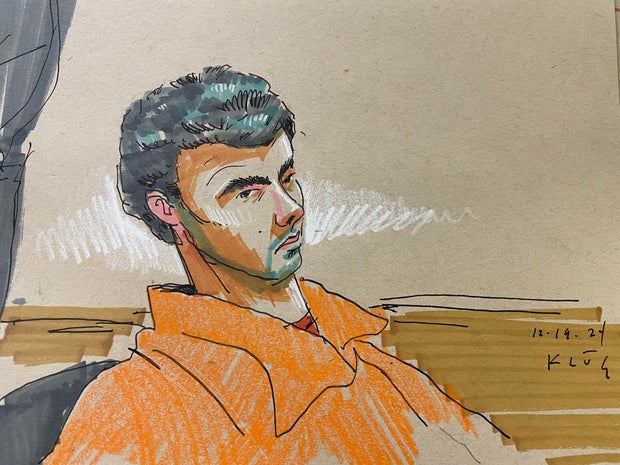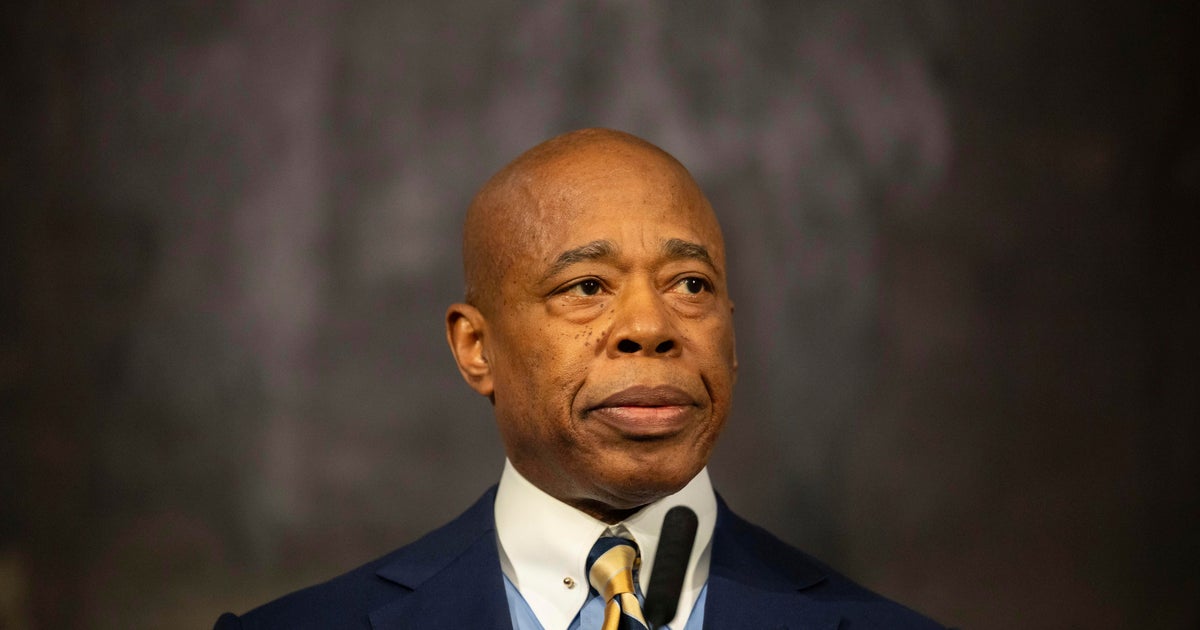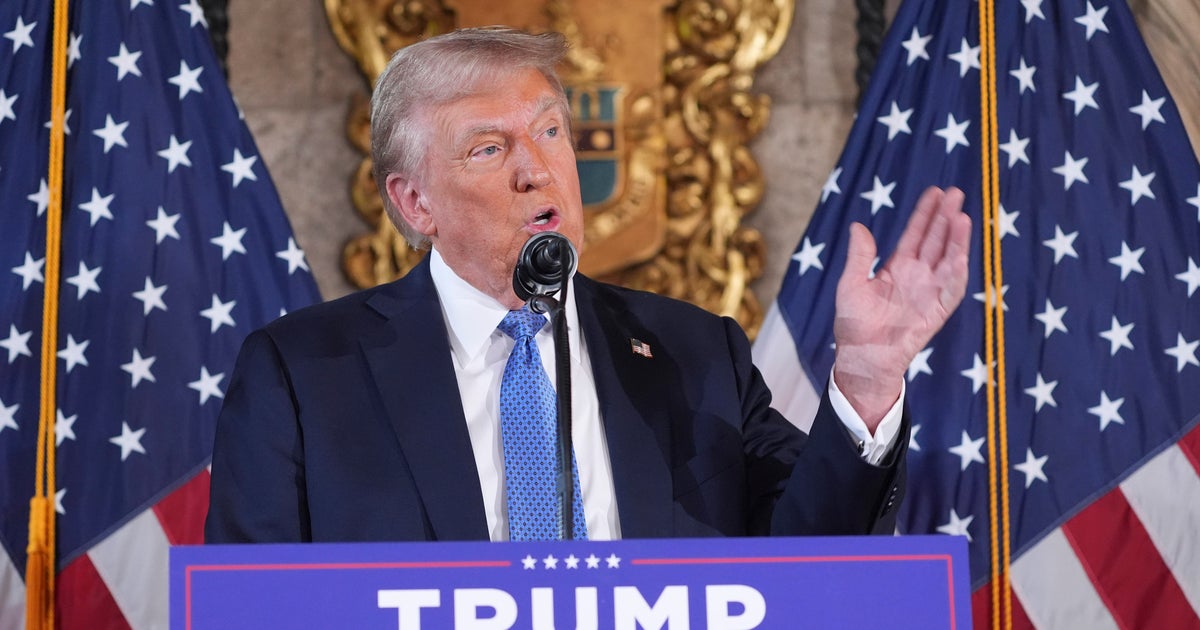UnitedHealthcare CEO suspect faces federal murder, stalking charges after returning to NYC
HOLLIDAYSBURG, Pa. -- UnitedHealthcare CEO murder suspect Luigi Mangione is back in New York Thursday after waiving extradition in Pennsylvania.
He was ushered from the courtroom to a waiting plane by NYPD detectives after waiving extradition.
Mangione could appear in front of a judge in New York City for arraignment in just a matter of hours.
The 26-year-old did not speak to reporters as he arrived at a Pennsylvania courthouse for his extradition hearing. NYPD detectives were on hand to ensure Mangione is transported back to New York City for his arraignment.
Mangione is expected to appear in a court in Manhattan Thursday for arraignment. He is then expected to be held at Rikers Island, where he will be in isolation and protective custody because of his high-profile status, sources said.
Mangione faces 4 federal charges
Mangione also faces four federal charges, including two counts of stalking, murder through the use of a firearm, and using a weapon equipped with a silencer.
According to the federal criminal complaint, Mangione "traveled from Georgia to New York, New York for the purpose of stalking and killing Brian Thompson."
The complaint also says the words "deny," "delay," and "depose" were written on the side of some of the shell casings found at the scene of Thompson's killing. These are viewed as a reference to a phrase used by insurance industry critics -- the "three Ds of insurance."
The complaint also details Mangione's movements surrounding the killing, saying he arrived at the Port Authority Bus Terminal on Nov. 24 and took a taxi to the hostel where he stayed on the Upper West Side. He used a fake New Jersey driver's license with the name "Mark Rosario" when he arrived. He removed his mask briefly when he checked in.
On Dec. 4, Mangione allegedly left the hostel at 5:35 a.m. and rode an electric bicycle near the location of the shooting, stopping at a coffee shop to buy some items. He then waited about an hour, according to the complaint before allegedly shooting Thompson.
He then allegedly rode into Central Park, and when he came out of the park, he no longer was carrying his backpack.
At 7 a.m., he allegedly caught a cab, and took it to the George Washington Bridge Bus Terminal. Police he believe that's when he left New York City.
On Dec. 9, he was spotted by a worker at a fast food restaurant in Altoona, Penn., and was taken into custody. When he was arrested, he presented his fake ID, according to the complaint. Responding officers also found him with "a loaded 9mm pistol and silencer consistent with the weapon used to kill the the victim, clothing that matched apparel that the shooter wore in the security camera videos, a notebook, several thousand in cash, and an envelope associated with an FDIC-insured bank, and a letter addressed "to the feds."
Authorities have also recovered a document roughly two to three pages in length in which Mangione allegedly expressed frustration with the health care industry.
"The federal government's reported decision to pile on top of an already overcharged first-degree murder and state terror case is highly unusual and raises serious constitutional and statutory double jeopardy concerns. We are ready to fight these charges in whatever court they are brought," Manhattan prosecutor-turned-defense attorney Karen Friedman Agnifilo said in a statement Thursday morning.
"As alleged, this defendant brazenly shot Mr. Thompson point blank on a Manhattan sidewalk. The Manhattan D.A.'s Office, working with our partners at the NYPD, is dedicated to securing justice for this heinous murder with charges of murder in the first degree. The state case will proceed in parallel with any federal case," the Manhattan DA's office said in a statement.
What it was like in the courtroom for the Mangione hearing
CBS News New York's Ali Bauman described the courtroom as packed. There were about a dozen NYPD officers seated in the front row waiting to take him back to New York.
"I mean, there were people sitting on the floors, people standing in the back. It was - people waiting outside to get in. Right now behind me, actually, there are even supporters of Luigi that are outside here with signs saying 'Free Luigi,'" Bauman reported.
Bauman said Mangione was clean shaven, wearing an orange jumpsuit, with his hands and ankles shackled. He appeared to be more subdued than his last appearance, Bauman reported, and "seemed relaxed, he at times was even smiling, and even shrugging, and being very expressive with his facial expressions."
Mangione signed the waivers for his extradition. When the judge asked him directly if he wished to waive, Mangione stood and answered "yes."
He was immediately remanded into NYPD custody to be flown directly to New York, instead of stopping first at the Pennsylvania prison where he was being held.
Mangione's attorney told the Pennsylvania court things have changed since they initially fought extradition last week, saying they have been in constant communication with his legal counsel in New York, and he is now confident this decision is in his client's best interest.
"We're ready to do this now. Before we weren't ready. It's in his best interest," Mangione's attorney Tom Dickey said.
There was a significant amount of downtime in the 90-minute hearing, Bauman reported. For some of it, Mangione whispered with his attorney, at times smiling and shrugging, making very animated facial expressions as they spoke. But when his attorney left at the desk alone to speak with the judge, Mangione read papers in front of him, talked to the sheriff's deputies standing beside him, and spent a while seemingly staring off into space.
Mangione was transferred to the custody of the NYPD after the hearing. He was escorted into an SUV and a caravan of six of them left the courthouse, with lights and sirens on, to take him to a waiting airplane for transport back to New York City.
Meanwhile, Pennsylvania prosecutors haven't dropped the forgery and gun charges against him, and his next court appearance in Pennsylvania is scheduled for February.
What about the first degree murder charge?
"The terrorism charge is there because it's the necessary component to get to first degree murder. Intentional killing in New York is only second degree murder, and the difference is you can't get life imprisonment without parole unless you get convicted of first degree murder. So they had to add the terrorism aggravating factor to ratchet it up to first degree so they can try get life imprisonment without parole," explained trial attorney Richard Schoenstein.
Schoenstein, who is not affiliated with the prosecution or defense in this case, offered analysis of the charge.
"I think the theory is that this defendant wanted to send a message with this killing. He had no personal connection that we know about to Brian Thompson. He didn't have an individual gripe with him. This killing was designed to make a statement about the health care industry. And you can have whatever you want to have about the health care industry, but shooting a guy in the back on the street to make a statement - that's not the way we make statements in this country. It is to send a message. It is arguably to invoke fear in people who work in that industry, and maybe even to persuade them, I don't know, to change what they're doing. And I think that's the kind of argument that's going to be made to support the terrorism charge," he said.
What is an extradition hearing?
Extradition is the process by which one state (or nation) surrenders an individual who has been accused, or convicted, of a criminal offense outside of that state's territory to the state where the offense occurred so the individual can face justice in that state, after the state requests it.
An extradition hearing is the legal proceeding in which evidence is reviewed to determine if there is probable cause to grant the extradition request.
By waiving the hearing, that review of evidence is waived, meaning they can proceed with necessary steps to face trial where a person has been accused.
What if Mangione contested extradition?
New York Gov. Kathy Hochul said Tuesday she had a plan -- and a warrant -- in place if Mangione did not waive extradition.
"When that happens, I will send that warrant to the governor. He has told me he will sign it immediately and the extradition will proceed," Hochul said. "He may waive that, there is word he may waive and come back on his own. But I'm ready to bring him back here and make sure that justice is served to someone who had the audacity to gun down any New Yorker, I don't care what their title is, with that brazen move on our streets, must result in severe consequences."
"The benefit is he gets his New York case to start. We already know that Pennsylvania has said they are not going to move forward with their case until the New York case is completed, and so this means that once he's here, he can actually be arraigned and the case can begin with respect to his New York charges," explained New York Law School professor Anna Cominsky.
Mangione's life behind bars
While Mangione was being held in Pennsylvania, he received dozens of emails and pieces of mail following his arrest last week at a McDonald's in Altoona, CBS News New York has learned.
He also had three visitors -- his attorneys -- including Friedman Agnifilo, who, before she became his attorney, said in an interview his best defense would be to plead not guilty by reason of insanity.
Mangione faces murder, terrorism charges
Mangione was initially indicted Tuesday on 11 charges, including on first degree murder in furtherance of terrorism, in the assassination of UnitedHealthcare CEO Brian Thompson on Dec. 4 in Midtown Manhattan.
"This was a frightening, well-planned, targeted murder that was intended to cause shock, attention and intimidation," Manhattan District Attorney Alvin Bragg said, adding the killing was "intended to evoke terror."






